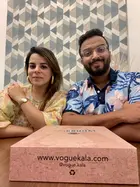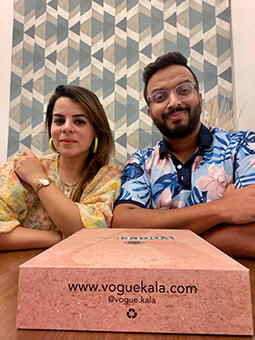
Startup Stories: Vogue Kala, an ESG-First Fashion Brand
In this series, we talk to student and alumni entrepreneurs about how they are making an impact with their startups.
Venture: Vogue Kala is an e-commerce “slow-fashion” brand that takes an environment-and-social-first perspective. The company’s mission is to provide fashionwear, sourced sustainably and ethically, and to become the first carbon negative fashion brand in the world.
Founder: Aditya Sinha ’14

What was the moment when you had the idea for this startup?
Twenty-twenty was a transformational year for the world—and 2021 is no different—for both good and bad. We were stranded in Dubai last year due to COVID and have since been unable to get back to New York. So, as we came to terms with our new normal, my wife and I were forced to take an existential step back.
While I continued to work as a partner with Mastercard’s Advisory Group in New York, I wanted to do more. The inspiration for Vogue Kala came from an innocuous question asked by my five-year-old daughter: “Dad, do our clothes help or harm the environment?” Bless the schools, they are doing their job, but it turns out the fashion industry is not. It was this question, and the need to actually make a difference, that was the driving force behind starting Vogue Kala.
What’s the problem you’re trying to solve or the gap that you’re trying to fill?
There are about 20 “fast-fashion” brands that dominate global fashion, not to mention the plethora of individual brands and companies starting up, given the low barrier to entry. However, the fashion industry continues to struggle to negate, or even mitigate, the high environmental and social impacts its operations have.
We see an opportunity here to actually craft a company that does not have a separate ESG strategy, because our business strategy is our ESG strategy. It’s something we do not see today, and it’s something that consumers are increasingly expecting, and demanding, from brands.
But too many brands continue to prioritize profits while putting three key issues on the back burner: environmental impact, labor conditions, and traceability and transparency.
Here’s s how we want to address each of these three areas:
- Environmental impact: thoroughly vet, test, and certify fabrics to ensure that their production has the least environmental impact from farm to fabric. We have partnered with One Tree Planted as our reforestation partner, and we have committed to planting 10 trees for each garment purchased.
- Labor impact: all our manufacturing and farming partners have been certified by third-party institutions like the Global Organic Textile Standard to ensure that farmers and garment workers are treated in a fair and ethical manner while earning a living (and not minimum) wage. By 2023, our goal is to be able to equitably distribute up to 5% of our global sales to farmers and garment workers involved in our supply chain.
- Traceability and transparency: This by far is the most important of all the tenets and underpins everything we do. Within the next 6-12 months, we want to be able to provide complete traceability of a piece of clothing as it moves from farm to finished garment, while providing information on impacts such as carbon emissions, water saved, waste prevented, etc. After all, what’s the point of being a “sustainable and ethical” business, if you don’t track and share your impact?
What was the most important resource Yale SOM contributed to your startup?
The network, the alums, the professors, the classes were all important and contributed in one way, shape, or form. But the biggest contribution was the mindset. Prior to coming to Yale SOM, my worldview was fairly capitalistic, and I could not envision business, government, and society coexisting in a meaningful way that actually provided value to each.
Yale SOM changed that thinking. It was evident in every class, every conversation, every project, that a business cannot exist in a vacuum, and that a business with the sole purpose of profit, with total disregard for its surroundings, will eventually fizzle out.
What’s the biggest milestone your startup has hit?
Here are a few notable ones:
- Finalizing our manufacturing and fulfillment partners during the pandemic
- Hitting 1,000 followers on Instagram and getting thousands of requests for products well before launch
- Getting our recyclable packaging designed and manufactured
- And last but not the least, finally having our website go live on July 4. (Come visit! We’re offering a 15% coupon code, “SOM15,” for all Yale SOM friends and family, in perpetuity.)



